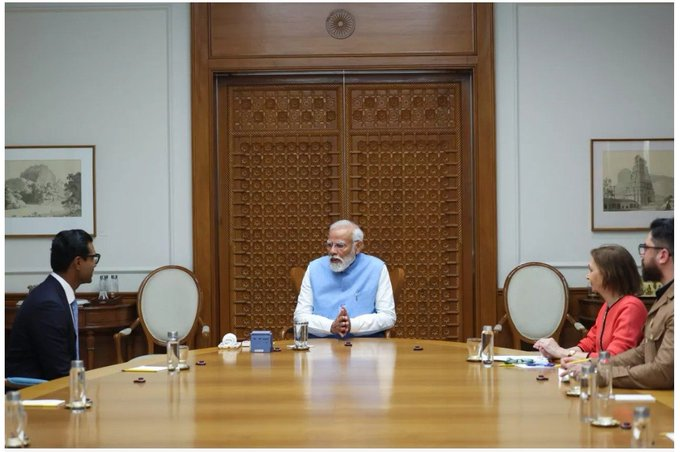Prime Minister Narendra Modi set to become first PM after Indira Gandhi to feature on Newsweek cover
The New York-based magazine has interviewed PM Modi who addressed Newsweek's written questions and followed up with a 90-minute conversation.
"We believe that when a country with one-sixth of the world's population adopts global standards in these sectors, it will have a big positive impact on the world.
Our policies that encourage businesses and entrepreneurship, coupled with world-class infrastructure and availability of skilled talent have yielded results".
"There are a few people in India and in the West who have lost [connection with] the people of India—their thought processes, feelings and aspirations. These people also tend to live in their own echo chamber of alternate realities.
They conflate their own dissonance with the people with dubious claims of diminishing media freedom."
PM's Newsweek Interview
"....micro-minorities like Parsis, are living happily and thriving in India".
“For the first time in our country, our government has come up with a unique saturation coverage approach when it comes to schemes and initiatives. They are not restricted for a group of people belonging to a particular community or a geography,” Modi was quoted as saying by the leading US-based weekly.
“They are meant to reach everyone, which means that they are designed in such a way that there cannot be any discrimination. Be it amenities like house, toilets, water connection or cooking fuel or be it collateral-free credit or health insurance, it is reaching every citizen irrespective of his community and religion,” he said.
During the wide-ranging interview carried by the magazine under the headline "Narendra Modi and the Unstoppable Rise of India", the prime minister, who is seeking a rare third term in office, talked about the border dispute with China and the criticism of ending Jammu and Kashmir's special status.
"More than one million polling stations would be set up across India. Constantly increasing voter participation is a big certificate for the people's faith in Indian democracy.
A democracy like India can move ahead and function only because there is a vibrant feedback mechanism. And our media plays an important role in this regard. We have around 1.5 lakh (150,000) registered media publications and hundreds of news channels," he said.
Modi said his government has an excellent track record of fulfilling promises.
"By the end of the second term, even the most popular governments start losing support. Discontent toward governments has also increased in the last few years in the world. India stands out as an exception, where popular support for our government is increasing," he asserted.
"India, as a democratic polity and global economic growth engine, is a natural choice for those looking to diversify their supply chains. We have undertaken transformative economic reforms: Goods and Service Tax, corporate tax reduction, bankruptcy code, reforms in labour laws, and relaxation in FDI norms. As a result, we have made significant improvements in ease of doing business," Modi told Newsweek.
"Our government has worked with the motto of "Sabka Saath, Sabka Vikas, Sabka Vishwas, Sabka Prayas," which means—Together, for everyone's growth, with everyone's trust and everyone's efforts."
"People have the trust that if someone else has got benefits of our programs, it will also reach them. People have seen that India has raced ahead from 11th largest economy to the fifth largest economy. Now the country's aspiration is that India soon becomes the third largest economy." - Modi
India is also well on its way to meet the 500 GW of renewable energy capacity and the climate commitment made in the Paris conference by 2030.
We have launched a $2.5 billion dollar National Green hydrogen mission which will contribute toward decarbonization and avert [a] further 50 MMT per annum of CO2 emissions by 2030.
We are launching 10,000 electric buses in 100 cities of India at a cost of almost $7 billion, giving a major boost to green urban mobility and reducing noise and air pollution.
India's per capita emission is already less than half of the global average. India will achieve net-zero emission by 2070 as announced - the PM said.
On competing with China
India, as a democratic polity and global economic growth engine, is a natural choice for those looking to diversify their supply chains.
We have undertaken transformative economic reforms: Goods and Service Tax, corporate tax reduction, bankruptcy code, reforms in labor laws, relaxation in FDI norms. As a result, we have made significant improvement in ease of doing business. We are striving to make our regulatory framework, our taxation practices as well as our infrastructure at par with global standards.
We believe that when a country with one sixth of the world's population adopts global standards in these sectors, it will have a big positive impact on the world.
Our policies that encourage businesses and entrepreneurship, coupled with world-class infrastructure and availability of skilled talent have yielded results. We have major global manufacturing entities setting up shops in India.










No comments:
Post a Comment